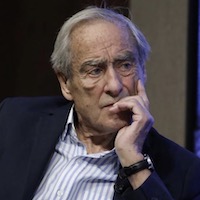News
Obituary: Harold Evans
Thursday 24 September 2020

Sir Harold Evans, who died in New York on Wednesday aged 92, was already a giant of journalism when he became Reuters editor-at-large in 2011.
Evans’ 70-year career as a hard-driving investigative journalist, magazine founder, book publisher and author made him one of the most influential media figures of his generation.
A pioneering former editor of The Sunday Times, he put a unique stamp on investigative journalism. Championing causes either overlooked or denied, he and his team uncovered human rights abuses and political scandals, and advocated for clean air policies.
One of his most famous investigations exposed the plight of hundreds of British children who had never received any compensation for their birth defects caused by thalidomide, a drug taken for pregnancy sickness. Evans organised a campaign to take on the drug’s makers, an effort that eventually won compensation for the families after more than a decade.
“All I tried to do - all I hoped to do - was to shed a little light,” Evans said in 2014. “And if that light grew weeds, we’d have to try and pull them up.”
After 14 years at The Sunday Times, Evans became editor of The Times shortly after Rupert Murdoch purchased the paper in 1981. Evans left a year later in a dispute with Murdoch over editorial independence.
A few years later, Evans moved to the United States with Tina Brown, the journalist and editor to whom he was married for nearly 40 years. He continued his career as an author, publisher and university lecturer. He wrote several books, including “The American Century” (1998) and its sequel “They Made America” (2004), as well as an ode to good writing called “Do I Make Myself Clear?” (2017).
Evans founded Conde Nast Traveler magazine and served as president and publisher of Random House from 1990 to 1997. Under his leadership, the publisher scored various successes, including the best-selling “Primary Colors,” a satire about Bill Clinton by Anonymous, later revealed to be journalist Joe Klein, and Colin Powell’s “My American Journey.”
Born to a family from what he called “the respectable working class,” Evans was knighted by Queen Elizabeth in 2004 for his services to British journalism. Two years earlier, a poll by Britain’s Press Gazette and the British Journalism Review named him the greatest newspaper editor of all time.
In his role as Reuters editor-at-large, Evans moderated conversations with global newsmakers in business and politics including Tony Blair, Al Gore and Henry Kissinger.
“Editor-at-large means you’re free to create as much havoc as they will tolerate,” he was quoted as saying by the Financial Times.
“Harry Evans was an inspiration, not only as a great journalist but as a great man. He had an insatiable intellect, extraordinary tenacity, high principle, and a generous heart,” Stephen Adler, Reuters editor-in-chief, said. “I am so grateful Harry became my mentor and friend, and all of us at Reuters are blessed to have worked with him and learned from him these past 10 years. His example will continue to guide us.”
Tom Glocer, former Thomson Reuters CEO, tweeted: “Bringing Harry to @Reuters was one of the highlights of my career.”
A train driver’s son from Greater Manchester, Evans entered journalism in what was then the traditional way, taking his first reporting job at a weekly newspaper at age 16. After serving in the military and earning a master’s degree, Evans became an assistant editor at the Manchester Evening News.
In 1967 The Sunday Times published an expose of high-ranking British intelligence officer Kim Philby’s decades as a Soviet spy, despite objections from the British government that the report would endanger national security.
When Murdoch bought The Sunday Times and The Times in 1981 from the Thomson Corp, he installed Evans as editor of The Times but the relationship quickly turned sour - and stayed that way. Evans said the British government allowed Murdoch to buy The Times newspapers on the strength of pledges he made to uphold editorial independence.
“He broke them all within a year,” Evans said in a 2013 Reuters interview. He said his own writings about then-Prime Minister Margaret Thatcher were the source of the rift with Murdoch.
“When she started to dismantle the British economy, the most cogent critic of that policy ... was The Sunday Times,” he told The Independent. “I wrote 70 per cent of that criticism myself. When I became editor of The Times, I continued to criticise monetarism.”
Within a year, Evans was ousted from The Times in what he called “the saddest moment of my life.” Murdoch said he made the move to avert a staff rebellion and insisted he had never tried to dictate newspaper policy.
That same year, Evans married Brown in New York. They had met in 1973 when she had been a writer for The Sunday Times.
In 1984, they moved to the United States, where he taught at Duke University in North Carolina and later held various positions with U.S. News & World Report, the Atlantic Monthly and New York Daily News among others.
Evans became a US citizen in 1993 and Brown followed suit in 2005. She said he died of congestive heart failure. ■
- SOURCE
- Reuters
- « Previous
- Next »
- 290 of 2176